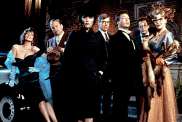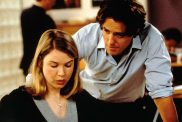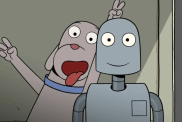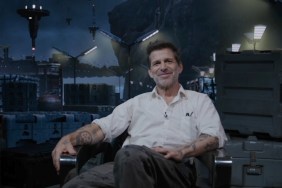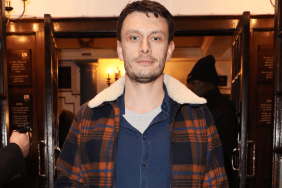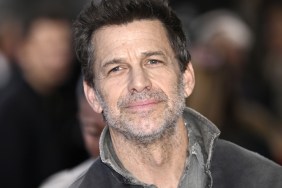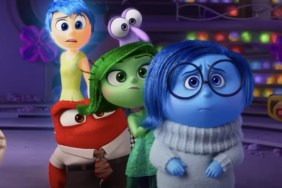
Director Andrew Niccol on the drone pilot thriller, Good Kill
Ever since his 1997 debut Gattaca, filmmaker Andrew Niccol has established himself in the world of science fiction with his original ideas about what the future might look like, but his latest movie Good Kill, his third film with Ethan Hawke, is far more grounded in the world as it is today than any of his previous work.
Good Kill goes inside the world of military drones with Hawke playing Major Thomas Egan, an Air Force pilot stationed at a base outside Las Vegas where he flies drones over Middle Eastern regions, both for surveillance and to take out potential terror threats. It’s a difficult job that starts to affect Egan’s home life with his wife (played by January Jones), especially after his team are assigned to work for the CIA, who are a lot less concerned with the collateral damage of innocent lives in order to take out “enemies.”
Drone warfare is very much a hot topic right now and although Good Kill doesn’t hit the viewer over the head with the politics behind drone strikes, it does make one wonder how far the government might go to protect its citizens. Imagine going through your daily life when a bomb or rocket takes out others around you. You never know when it’s coming and there’s very little you can do about it, and it poses the question when the unfair advantage the government has over those declared enemies should be considered terrorism just as much as their attacks on us.
ComingSoon.net got on the phone with Niccol to talk about this thought-provoking thriller which debuted way back at the Toronto International Film Festival in 2014 and is finally coming to home video on September 1. (We also asked Niccol about the most recent project he’s been attached to, which is the long-in-development movie based on the board game, Monopoly.)
ComingSoon.net: Over the years, you’ve done a lot within the realm of science fiction, although “Lord of War” was more grounded in the real world. Everything in “Good Kill” could really happen and probably has, so was that something very conscious for you to try to do something more in that vein?
Andrew Niccol: I don’t kind of think like that. The stories come to me, whether they’re contemporary or like “Lord of War” or whether they’re sci-fi. It’s just whatever kind of touches me at the time, so it wasn’t a conscious decision. But in a strange way, it looks like science fiction, even though in a weird way, it’s a period piece because it’s set in 2010, but it does seem sci-fi, this whole concept of this long distance war that we’re having.
CS: You directed “The Truman Show” years ago and it had a sense of voyeurism, which I think “Good Kill” takes even further but it’s using weapons in that realm.
Niccol: When I told a friend what I was making, he said, “Why on Earth are you doing that? It doesn’t seem like your kind of film.” Then I read an article about the drone program and it said that “it’s more ‘Truman Show’ than ‘Terminator’”–it’s a bit of both–but I guess that’s why I’m slightly drawn to it. Ethan’s character in the movie has almost a relationship with the people that he’s watching, which is what happens with drone pilots, is that they have this sort of vicarious relationship, so I can kind of see why it might have touched me.

Niccol: Yeah, I had to rely on ex-drone pilots, and there’s so much burnout, which is kind of what you sort of see with Ethan’s character in the movie, that they are available out there. There are a few things that they won’t say, that they won’t tell you, but I relied on them heavily to make the movie look and sound authentic, so yeah, that was an important part of it. The other thing that I relied on was Wikileaks, because that’s the only way you can really see a drone strike, is through Wikileaks, so I should’ve credited Chelsea Manning as a researcher for the film. And it’s ironic of course, because there is a video with every drone strike because that’s how it’s done, but we rarely see them.
CS: Obviously after 9/11, it was very prominent in the news. I think the first time I was even aware this technology exists was when I saw “Syriana” and then obviously in video games, they started using them a lot more, too. Were you well aware of this stuff even before you got the script or got involved with this?
Niccol: I knew that after 9/11, that’s when it began, which is another thing that was kind of interesting. The drone program started with George W. Bush and it’s been expanded under President Obama. It’s sort of the only thing I think that the US Congress agrees on, is that we should have a drone program, so that was an interesting aspect about it as well for me.
CS: You mentioned talking to ex-drone pilots and finding out more about the job? You really do get into the mind of what these guys go through both during and after a shift.
Niccol: No, there’s some stuff that I left out because it was too outrageous. Some of the younger drone pilots that I spoke to, they’d work a shift fighting the Taliban 7,000 miles away for 12 hours, then they would go to their apartment off the Vegas strip and play video games. That was just so outrageous because of course how could you possibly separate yourself now from the war and how is it not becoming sort of like a video game to you? I just couldn’t put that in there. I just felt no one would believe it, even though it’s true.
CS: There is a line in there where the guy in command, played by Bruce Greenwood, says that a lot of those recruited are gamers and they get them into the program because they already have the experience.
Niccol: All of that’s absolutely true. They actually use Xbox or PlayStation technology, because that’s the best way to fly a virtual plan. You can’t make this stuff up.
CS: Obviously, you’ve had a great relation with Ethan over the years, having done a couple of movies with him. Was he the first actor that came to mind to play that role?
Niccol: I never sort of write with anyone in mind. When I finished it I thought, “Oh yeah, Ethan is the right guy.” It’s odd because Ethan is kind of a grungy guy, you know? I always make him a figure of authority which is crazy. I’ve made him an astronaut and an Interpol agent, and now I’ve made him a fighter pilot, which is kind of nuts. Whenever he needs a haircut, he comes to me, it’s strange. (chuckles)
CS: That’s really funny. I guess by now you know that he can do a lot of research on his own and figure out how to approach the character beyond what you write in the script as well.
Niccol: Yeah, we always rehearse, but what I did for him specifically for this is I gave him his own personal form of PTSD, where what I did was I set him down and made him watch a whole reel of drone strikes, just to basically embed it in his head, so it’s kind of an unusual thing to do, but it helped the authenticity of it for us.
CS: Did you do that with all the actors involved in those scenes?
Niccol: Yeah, obviously Zoe Kravitz’s character is important, and it’s weird because of course the reason they’re drawn to each other is that they’re going through something together. They’re the only ones who can understand what each one is going through, but that’s why he sort of becomes closer to her than his own wife, and it’s a common thing with PTSD.
CS: Is it common for the CIA to be involved in these kinds of drone strikes, to take over the drone program like we see in the movie?
Niccol: The CIA, what they do is they contract out the Air Force because they don’t fly themselves. The ex-drone pilots that I had as consultants, I said to them later, “Well, obviously you flew missions for the CIA, right?” All they would say to me is, “We can’t talk about that.” (chuckles) They wouldn’t even say those three letters, CIA. They would call them OGAs, which stands for “Other Government Agencies,” but yes, it’s common knowledge that’s what they do. Of course, there was a big tug of war between the Air Force and the CIA because the CIA had become a new branch of the military, they’d gone from the spying business to the killing business, but that’s controversy there.

CS: I like the fact that you have Zoe’s character in the film, because obviously there are women soldiers who are doing this as well. As we see in the movie, there’s some horrendous stuff they see while monitoring the situation there. Can you talk about the decision to include a woman soldier in the film?
Niccol: Well, there are a lot of sensor operators and pilots now that have never even flown a plane, and with Zoe’s character, again I tried to make it authentic, because the people who fight our wars for us are young and minorities, and therefore, I felt it was important that she symbolize that in some way. They do see atrocities. The drone pilots I spoke to said that they witnessed things that had nothing to do with their mission, and they wanted to take the law into their own hands, but they obviously couldn’t without giving away that they were there. So that was inspired by things they actually told me.
CS: If I lived in that area after the first strike, I’d be really paranoid because obviously there’s someone out there dropping those bombs.
Niccol: Right. It is interesting that you can look up into the sky and you will not see the drone that’s watching you. You can look directly at it because it’s a mile high in the sky. Of course, that raises an interesting question. At what point is the war on terror creating terror? There’s that scene where Ethan’s character talks about blue skies and how their kids grow up scared of blue skies. They’re actually happier if it’s overcast because it’s less likely that the drones are flying on that day. It’s kind of a startling change to humanity. People are also afraid to rescue bomb victims and they’re afraid to congregate at all, so it’s interesting what this tactic of the drone program is doing to that part of the world.
CS: There’s also the question that if we can do it to them, why can’t they do it to us?
Niccol: Eventually, of course they will, you know? At the moment, what we’re doing can only work in an uncontested airspace, because if the Taliban had an Air Force, then it would be more of a fair fight. Also, you couldn’t use a drone because the drone is just a sitting duck to an Air Force fighter jet, but they are making the drones better. They’re now able to take off and land from aircraft carriers, which is something they never could do before. That was something just that the top guns could do it, but now, the drones are getting better. Soon, everyone will have one.
CS: I know. That’s what’s scary about it. There’s a lot of moving parts to this, so did you shoot a lot of the Afghanistan scenes first and then show them to the actors while they were doing their scenes? How did that actually work as far as getting those two things to sync up?
Niccol: Yeah, I shot in Morocco and I shot that for Afghanistan and Yemen. I sort of cut those scenes together so that the actors would have something to play to so that they weren’t just looking at blue screen monitors. So yeah, that was an important part to be able to do that. That was an interesting thing as well because normally when you’re location scouting, you do it from the ground, but I couldn’t do that because I knew that of course from a drone pilot’s point of view, they would never be on the ground. So in Morocco, I was always in the air, either on a really tall crane or in a helicopter. (laughs) It was a strange experience for me because they would drive me into a town and they’d say, “Andrew, what do you think of this town?” I would say, “I don’t know yet,” because I needed to see it from above.
CS: I wanted to ask about another thing you’re developing now. I know they’ve been trying to develop a “Monopoly” movie for many years, and I’ve talked to Ridley Scott, who had a take on it, which was really interesting. I was curious about taking on something like that, which has kind of been in development for a while. Is that something you had a good take on it, you wanted to do?
Niccol: No. As my kids said, when he saw me with the “Monopoly” board out, they said, “Wow, you’re finally going to make a movie we can go see.” (laughs) So for me, it’s kind of liberating, in a way, just to tap into the more absurd side of my personality.
CS: He was going more for a movie about high finance, that kind of thing, so I imagine your take a little more kid friendly?
Niccol: Yeah, I think Lionsgate wants it to be as accessible as possible.
CS: Is that possibly what you’re doing next?
Niccol: I don’t know. I mean, I’m just starting that process, so it’s too early to say.
Good Kill is now available on Digital HD and will be available on Blu-Ray, DVD and On Demand on Tuesday, September 1. You can order your copy by clicking here. You can also hear what Ethan Hawke had to say about the film in our previous interview.
(Photo Credit: Juan Rico/FAMEFLYNET PICTURES)
Good Kill
-
Good Kill

-
Good Kill

-
Good Kill

-
Good Kill

-
Good Kill

